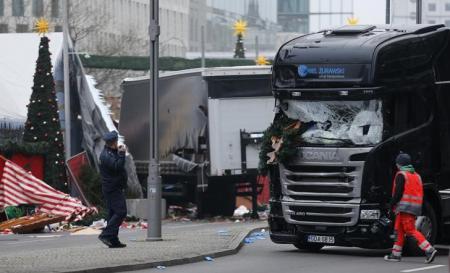
By Joseph Nasr and Isla Binnie
BERLIN/ROME (Reuters) – Germany on Thursday released a Tunisian man detained on suspicion of involvement in the truck attack at a Berlin Christmas market last week, and Italian police searched houses in and around Rome where the main suspect may have spent time.
Investigators across Europe are trying to determine whether Anis Amri, a failed asylum seeker from Tunisia who was shot dead by police in Milan on Friday after killing 12 people in Berlin in the name of Islamic State, had any accomplices.
A spokeswoman for Germany’s Federal Prosecutor’s Office said the Tunisian man had been detained on Wednesday on suspicion Amri may have sent him a voice message and picture shortly before the attack.
“Further investigation has shown that the arrested person was not the possible contact person of Anis Amri and therefore he was released,” Frauke Koehler told reporters in Karlsruhe.
Investigators had found the mobile phone number of the released 40-year-old Tunisian stored in Amri’s phone. His home and business premises were raided. He was not named.
Koehler said a video circulated on the Internet after the attack showing Amri at a bridge in Berlin swearing allegiance to Islamic State and urging Muslims to carry out more attacks was authentic.
Amri arrived in Europe by boat to the Italian island of Lampedusa in 2011 and travelled to Germany last year where he was facing deportation after his asylum application was rejected.
In Italy, police focused searches on a small town south of Rome where Amri was thought to have stayed with a Tunisian he met in Lampedusa, a judicial source said.
PISTOL
Italian Prime Minister Paolo Gentiloni said Amri was probably radicalised after arriving in Europe in 2011 but the government had no evidence he had “particular networks” in Italy.
“Five years ago he was not a jihadist … In desperation, in isolation, in alienation, he found the conviction to follow the path of radicalisation,” Italy’s anti-terrorism chief Franco Roberti told la Repubblica newspaper.
Amri’s passage to Italy, via France, from Germany after the attack has prompted eurosceptic parties to call for the reintroduction of border controls, removed under Europe’s open-border Schengen pact.
In Germany, conservative politicians have demanded tighter immigration rules and tougher security measures and the far-right Alternative for Germany (AfD) party blamed Chancellor Angela Merkel’s asylum policies for the attack.
Koehler said officials assume Amri had also been in the Netherlands after the attack. She said SIM cards found on him were obtained “for free” in the Netherlands in the days before Christmas.
She said Amri had fired a .22 caliber pistol of the make Erma at police in Milan who stopped him for a search on Friday and that a .22 caliber cartridge was found in the truck’s cockpit in Berlin.
More forensic tests were needed to determine if the same gun was used to kill the Polish driver of the truck who, Koehler said, died shortly before the attack.
She said the truck’s automatic braking system stopped the vehicle 70-80 metres after it hit the market, avoiding more casualties.
Italy tried to deport Amri to Tunisia after he completed a four-year jail term for attempting to set fire to a building, but Tunisian authorities refused to take him, so he was released.
(Additional reporting by Ursula Knapp in Karlsruhe and Steve Scherer in Rome; Writing by Joseph Nasr; Editing by Janet Lawrence)
